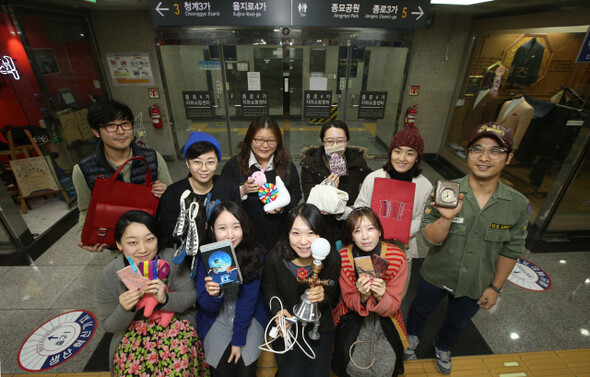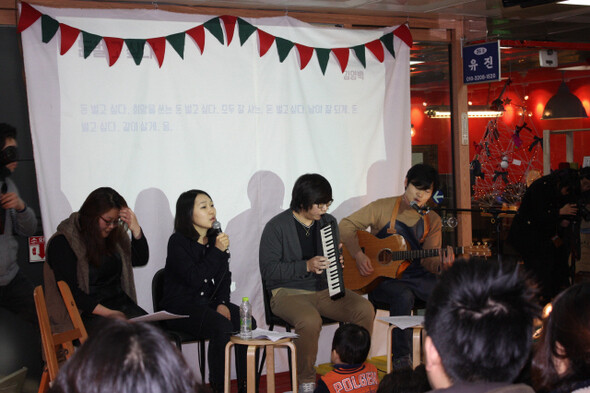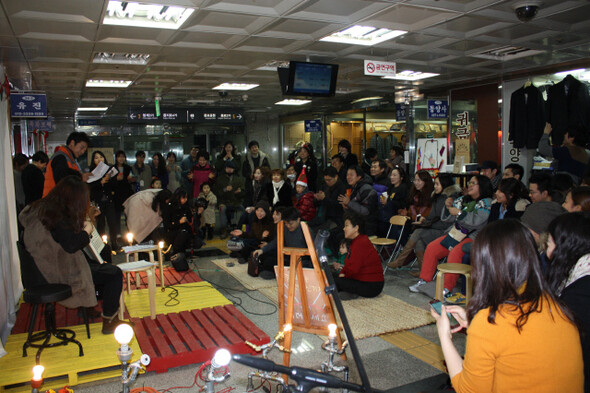hankyoreh
Links to other country sites 다른 나라 사이트 링크
[Feature] Young entrepreneurs revitalize fading underground shopping center

By Jung Tae-woo, staff reporter
In November of last year, young people congregated in the underground shopping center in Jongno 4-ga, Seoul. In a place where commercial activity has diminished, the young people have nested in empty stores to run their own businesses selling their own items. Will those who challenged themselves to do ‘what they enjoy’ achieve their dream and help the underground shopping center recapture its vigor?
“I wanna make some money. Just like the others. / I work as much as they do, but why am I the only one who starves all the time. Hmm~ /…/ I wanna make some money, writing hopes/ I wanna make some money, having everyone well off/ I wanna make some money, helping others be better off/ I wanna make some money, to live together Hmm~”There was a small performance on Dec. 21 in an underground passageway in Jongno 4-ga. A song was sung by composer and writer Kim Young-baek, 39, to celebrate The Youth, Jongno, and the Underground Shopping center. Kim moved into and now owns Young’s Workshop. The young business owners and the preexisting shop owners also made an ensemble during the performance. When the song ‘Dongbaek Lady’ was played with a guitar and an accordion, nearby shop owners burst into applause.

Jongno 4-ga underground shopping to celebrate ‘The Youth, Jongno, and the Underground Shopping Center' was once well known for household items and tailored suits. It used to be crowded with soon-to-be married couples. However, it has become a desolate area with few customers due to the economic downturn and trends in Korean society. 250 people at most visit the complex per day. The low number of customers is attributable to the complex’s distance from the subway station and the on-the-ground pedestrian crossing built in 2011, which means that fewer and fewer people now pass underground. The facilities of the center are old fashioned and so are the shop owners; they haven’t been able to handle the crises. There are now more empty stores. Will the underground shopping center end up fading away like the embers of a dying fire?
Seoul Metropolitan Facilities Management Corporation (SMFMC), which is affiliated with Seoul Metropolitan Government, has managed the center and consulted with the city’s Youth Job Herb (The Youth Herb) to find a solution. The Youth Herb was in need of space for youth job creation. Both sides agreed to revitalize the lagged underground shopping center and find opportunities for unemployed youth in July of last year by offering empty stores in the Jongno 4-ga underground shopping center. SMFMC offered space and The Youth Herb offered human resources, which are now the engine of market revitalization.
SMFMC and the Youth Job Herb have chosen the businesses carefully. They paid closer attention to ‘empathetic ideas’ and the revenue model of a business than to the so-called specifications or educational backgrounds of applicants. They didn’t ask what university the applicant had graduated from. They planned to make the shopping center fun and unique with the help of the young applicants’ self-motivation and creativity. They laid out a plan to bring in more people, and eventually revitalize the underground shopping center. Accordingly, 17 out of 109 empty stores have been occupied by young entrepreneurs. 25 people from 14 groups have moved in and starting business.
SMFMC president Oh Sung-kyu said, “Although the underground shopping center is public property, its management has been devoted to making money, and therefore it has failed to fulfill its social function. Youth business is the answer to unemployment and an experiment for public economy. It is very important for the young business owners a develop self-sustainable base over a year and from then on.”
Various kinds of businesses have been chosen by the young entrepreneurs: tannery, general store, contemporary hanbok (traditional Korean attire), sock puppets, knitting, vintage watches, home bakery, handcrafts, teaching aid robots, fabric design and so on. A social enterprise called ‘Ssamzie Farmer’ has also participated. Though the areas of business expertise differed, they all shared a common purpose, ‘conveying values of a product in producing one and filling it with a story.’
KimYoung-baek, who graduated from a seminary, has opened a leather crafting shop. He said, “I learned leather crafting after pondering over ‘the value of hands as the basic unit of living together’ when he was a missionary. It is good to have some space to work but better to have young business owners to share it with.” Kim is looking for a way to commercially cooperate with other entrepreneurs to make leather products watch straps, leather items for hanbok and so on.
Ssamzie Farmer makes bags and shoes with leftover fire hoses, rice sacks and banner cloth. Owner Chun Jae-yong, 37, said, “No other area has better accessibility than this shopping center. As long as the contents are good, there is potential. With experience in distribution, we are planning to sell products made by our colleagues at the stores near Hongik University [a popular area for young people in Seoul].” Chun is also planning to hold a meeting for young business owners and advertise the community via social media.
Lee Min-kyung, 27, who majored in journalism in graduate school, had been interested in alternative media and opened a store called ‘World’s Folksong’ to sell products with stories. She said, “We carry robotic lights that are made of pipes. I would like to cover news regarding master artisans working in Gwangjang Market or Yeji-dong Market near Jongno 4-ga later.”
Nam Seung-min, 37, who had been preparing for an exam after finishing his degree in creative writing, started to collect watches he likes in an effort to reduce the weight of his life. He repairs used watches with the help of artisans with whom he made connections while collecting watches. He now sells the watches on foreign online shopping malls. Mr. Nam said, “Items from the past can bring countless stories. We hope that the place we’ve created will be a cradle of creativity.”
Choi Sun-hee, 30, who studied clothing and costumes in college and has worked at a hanbok tailor shop for 6 years, is thinking of making ‘traditional machine-washable hanbok.’ Choi said, “I make less but feel extremely happy. I even launched a workshop where accessories are made with hanbok materials.”
Aspirations are big, but the underground center is still at its beginning stages. One month has now passed since the place opened. Most customers order products online, or visit the place after hearing about it through word of mouth. The young business owners are planning to launch a cooperative brand this year, and publicize the value of handmade products. SMFMC is also looking for a way to sell their products by utilizing other facilities. It plans to expand space for young people, not only in Jongno 4-ga stores but elsewhere in the Gangbuk area (north of the Han River).

Above all, the preexisting shop owners at Jongno 4-ga underground shopping complex have taken a different attitude. They weren’t welcoming in the beginning, but broke their silence as new business owners greeted them with smiles and asked questions. Song Gwan-yong, 56, who has made tailored hanbokfor 40 years, said, “Given that the shopping center was dying, it is good to have young business owners in the empty stores. However, I’m worried that their products might not be marketable. They need to make money to survive.” He also provided some warm advice, “To succeed, the store should stay open every single day.”
Kim Nak-hoon, 66, said, “It is still a little awkward. However, there’s a generation gap between the preexisting shop owners and the new ones. I believe the number of customers will increase as we help each other.” Jeon Myung-hoon, 56, president of Jongno 4-ga underground shopping complex community, said, “The shopping complex has become vibrant as young entrepreneurs move into the idle stores.”
The young entrepreneurs, who chose their own paths while everyone else yearns for jobs, seem to have many obstacles ahead of them till they put down firm roots at the Jongno 4-ga underground shopping center. Their tasks still seem ambitious.
A representative of social enterprise ‘E-Eum’, Kim Byung-soo, advised “not to just sell products but to organize a variety of events such as performances, parties, youth workshops, and academy management.” He insisted on "combining the products with ideas and technology.” He helped 24 youth businesses to establish themselves under the name of ‘the youth mall’ in Nambu Market, a well-known market in Jeonju, North Jeolla Province. Kim didn’t forget to pass along a request, “It is important to propose and share ideas when starting a business. Business is also a culture. We should pay attention to social trends and consider what message to deliver to the public; that’s just as important as working hard.”
The director of Youth Job Herb, Chun Hyo-gwan, said, “Young entrepreneurs’ attempts to found their own business are meaningful as it builds the future of Seoul from the city’s past. Building a win-win structure by deriving potential from the artisans near the underground shopping complex with the youth’s sensitivity will be a key to success.”
Translated by Kim Hae-yoon, Hankyoreh English intern
Please direct questions or comments to [english@hani.co.kr]

Editorial・opinion
![[Column] Season 2 of special prosecutor probe may be coming to Korea soon [Column] Season 2 of special prosecutor probe may be coming to Korea soon](https://flexible.img.hani.co.kr/flexible/normal/500/300/imgdb/original/2024/0426/3317141030699447.jpg) [Column] Season 2 of special prosecutor probe may be coming to Korea soon
[Column] Season 2 of special prosecutor probe may be coming to Korea soon![[Column] Park Geun-hye déjà vu in Yoon Suk-yeol [Column] Park Geun-hye déjà vu in Yoon Suk-yeol](https://flexible.img.hani.co.kr/flexible/normal/500/300/imgdb/original/2024/0424/651713945113788.jpg) [Column] Park Geun-hye déjà vu in Yoon Suk-yeol
[Column] Park Geun-hye déjà vu in Yoon Suk-yeol- [Editorial] New weight of N. Korea’s nuclear threats makes dialogue all the more urgent
- [Guest essay] The real reason Korea’s new right wants to dub Rhee a founding father
- [Column] ‘Choson’: Is it time we start referring to N. Korea in its own terms?
- [Editorial] Japan’s rewriting of history with Korea has gone too far
- [Column] The president’s questionable capacity for dialogue
- [Column] Are chaebol firms just pizza pies for families to divvy up as they please?
- [Column] Has Korea, too, crossed the Rubicon on China?
- [Correspondent’s column] In Japan’s alliance with US, echoes of its past alliances with UK
Most viewed articles
- 1[Column] Season 2 of special prosecutor probe may be coming to Korea soon
- 2‘We must say no’: Seoul defense chief on Korean, USFK involvement in hypothetical Taiwan crisis
- 3Is N. Korea threatening to test nukes in response to possible new US-led sanctions body?
- 4Division commander ordered troops to enter raging flood waters before Marine died, survivor says
- 5Amnesty notes ‘erosion’ of freedom of expression in Korea in annual human rights report
- 6Is Japan about to snatch control of Line messenger from Korea’s Naver?
- 7No good, very bad game for Korea puts it out of Olympics for first time since 1988
- 8[Editorial] Korea’s surprise Q1 growth requires objective assessment, not blind fanfare
- 9N. Korean delegation’s trip to Iran shows how Pyongyang is leveraging ties with Moscow
- 10Korea’s 1.3% growth in Q1 signals ‘textbook’ return to growth, says government